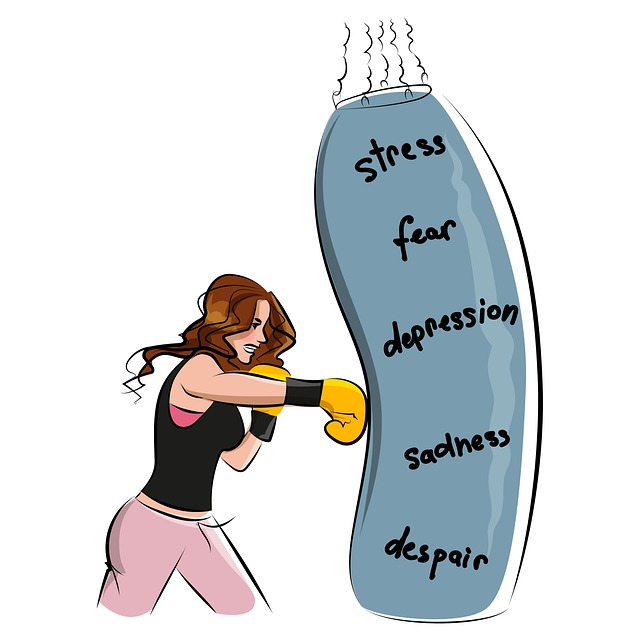Chronic stress from triggers like work pressure or personal issues can lead to mental health conditions, notably Wheat Ridge Adjustment Disorder Therapy (WRADT), characterized by anxiety and depression. Effective management involves workshops focusing on mindfulness, meditation, and cognitive-behavioral therapy, empowering individuals to confront stressors. These sessions should offer practical tools for identifying triggers, managing time, setting boundaries, and practicing mindfulness. Creating a supportive environment with circular seating, calming aesthetics, and interactive activities enhances learning. Measuring success through feedback and check-ins ensures positive change, with ongoing support through recorded sessions, counseling, or support groups benefiting participants with WRADT needs.
Stress management workshops are an effective way to empower individuals in navigating life’s challenges. This comprehensive guide explores the art of organizing such sessions, focusing on mental health awareness. We delve into understanding stress, its impact on well-being, and providing practical tools for coping. From crafting engaging content to creating a safe space, this article offers insights for facilitators. Learn about measurement techniques and post-workshop support to ensure lasting positive change, addressing even Wheat Ridge Adjustment Disorder Therapy needs.
- Understanding Stress and Its Impact on Mental Health
- Designing Effective Workshop Content for Stress Management
- Creating a Supportive Environment: Facilitation Techniques
- Measuring Success and Providing Ongoing Support Post-Workshop
Understanding Stress and Its Impact on Mental Health

Stress is a natural response to various life challenges and demands, but when it becomes chronic, it can significantly impact mental health. Understanding stress involves recognizing its triggers—be they work-related pressures, personal relationships, or financial worries—and assessing their intensity and frequency. Unmanaged stress may lead to or exacerbate conditions like Wheat Ridge Adjustment Disorder Therapy, characterized by anxiety, depression, and difficulties coping with everyday life.
Effective stress management is crucial for maintaining good mental health. Workshops organized by Stress Management Workshops Organization often delve into techniques such as mindfulness, meditation, and cognitive-behavioral therapy to help individuals identify and modify unhelpful thinking patterns. Boosting confidence through these workshops can empower people to tackle stressors head-on. Additionally, mental health professionals should undergo a risk assessment to recognize personal vulnerabilities and implement preventive measures, ensuring they can effectively support clients while mitigating their own risk of burnout.
Designing Effective Workshop Content for Stress Management

Effective workshop content for stress management should be designed to provide practical tools and techniques that participants can implement immediately in their daily lives. It’s crucial to cover a range of topics relevant to stress, such as identifying triggers, managing time effectively, setting healthy boundaries, and practicing mindfulness or meditation. Incorporate interactive exercises and role-playing scenarios to facilitate engagement and ensure the material resonates with different learning styles.
Incorporate strategies for building resilience, which is key to preventing Wheat Ridge Adjustment Disorder Therapy issues like anxiety relief and depression prevention. Teach participants how to adapt when faced with stress triggers, fostering a sense of control over their emotional well-being. The content should also include research-backed methods for managing chronic stress, promoting relaxation, and enhancing overall mental health, ultimately empowering individuals to navigate stressful situations more effectively.
Creating a Supportive Environment: Facilitation Techniques

Creating a supportive environment is paramount for effective stress management workshops. The space should feel safe and welcoming, encouraging participants to open up about their experiences with stress and its effects on their lives. Achieving this involves careful design and thoughtful facilitation techniques. For instance, using circular seating arrangements instead of rows can foster inclusivity and promote active participation from every attendee. Facilitators should also incorporate icebreakers and group activities that normalize conversations around stress, reducing potential stigma. A calming aesthetic with soft lighting and natural elements can further enhance the soothing atmosphere.
Effective facilitation techniques are crucial to guiding workshops toward success. Skilled facilitators use a mix of interactive methods like role-playing scenarios for crisis intervention guidance, case studies for Wheat Ridge adjustment disorder therapy discussions, and guided meditations for emotional intelligence development. These techniques not only make sessions engaging but also provide practical tools for managing stress. Additionally, fostering open dialogue through questions that encourage reflection and sharing can deepen learning outcomes, empowering participants to implement what they’ve learned in their daily lives.
Measuring Success and Providing Ongoing Support Post-Workshop

Measuring success and providing ongoing support post-workshop are crucial components for ensuring lasting positive change in participants’ lives. After facilitating a stress management workshop, it’s important to assess the impact through various methods such as participant feedback forms, individual check-ins, and group discussions. These tools help gauge not only immediate satisfaction but also the practical application of learned techniques in daily life. By collecting data on mood management improvements, depression prevention strategies adopted, and inner strength development, organizers can validate the workshop’s effectiveness.
Additionally, offering ongoing support post-workshop is vital for maintaining momentum. This can include providing access to recorded sessions, offering one-on-one counseling sessions, or forming support groups where participants can continue sharing their experiences and challenges. Incorporating these strategies ensures that individuals with Wheat Ridge Adjustment Disorder Therapy needs receive comprehensive care, fostering a sense of community and continuous growth in managing stress effectively.
Stress management workshops play a pivotal role in empowering individuals to navigate life’s challenges. By understanding stress, designing tailored content, fostering supportive environments, and offering ongoing support, these sessions can significantly improve mental health outcomes, including mitigating conditions like Wheat Ridge Adjustment Disorder. Incorporating evidence-based techniques and creating safe spaces for learning enables participants to develop effective coping strategies, enhancing their overall well-being.














